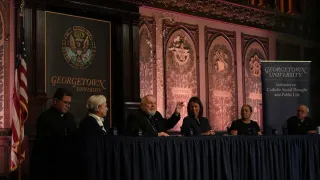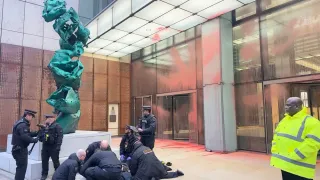July 14, 2016
Ginsburg's Public Trump Critique Raises Ethical Quandaries
Michael Biesecker READ TIME: 3 MIN.
WASHINGTON -- Supreme Court Justice Ruth Bader Ginsburg's public criticism of Donald Trump is dividing legal experts over whether the leader of the court's liberal wing should recuse herself in any future case involving him.
In an interview last week with The Associated Press, Ginsburg presumed Democrat Hillary Clinton will be the next president. Asked her thoughts on the possibility of a Trump win, she said, "I don't want to think about that possibility," and amplified her view in two subsequent interviews.
She called Trump a "faker" who "really has an ego," in a CNN interview. To the New York Times, she said: "I can't imagine what this place would be - I can't imagine what the country would be - with Donald Trump as our president."
Trump quickly fired back at Ginsburg, who was appointed to the high court in 1993 by his opponent's husband, former President Bill Clinton. He tweeted Wednesday that the 83-year-old justice was an embarrassment for making "very dumb political statements about me. Her mind is shot - resign!"
Other Republicans have chimed in, including Senate Majority Leader Mitch McConnell of Kentucky, who called Ginsburg's remarks "totally inappropriate."
"She oughta stay out of it," said Senate Judiciary Committee Chairman Chuck Grassley (R, Iowa). "It hurts the court when she does that."
While Ginsburg's remarks were relatively tame in an era of hyper-partisanship, experts in legal ethics told AP that she likely ran afoul of Canon 5 of the Code of Judicial Conduct, which says a federal judge "should not . publicly endorse or oppose a candidate for public office."
"This is nothing casual," said Arthur D. Hellman, a professor at the University of Pittsburgh School of Law. "The aim, I suppose, is to influence the election. ... If a lower-court judge had said those things, they would be subject to disciplinary proceeding."
But those rules aren't legally binding on Supreme Court justices, who as the highest ranking officials in the U.S. justice system are the final arbiters of their own legal ethics.
Ginsburg has been increasingly willing to publicly discuss issues involving the court. She has used media interviews to tamp down speculation about her retirement, especially after she had an operation for pancreatic cancer in 2009 and following the death of her husband the next year.
Ginsburg had previously said she expected a Democrat to win in 2016, meaning she could delay retiring because her replacement would be chosen by a member of that party. But before last week's comments about Trump, she had never dipped so boldly into partisan politics.
Stephen Gillers, professor at New York University School of Law, called Ginsburg's comments "imprudent." He pointed to a federal law that states, "Any justice, judge, or magistrate judge of the United States shall disqualify himself in any proceeding in which his impartiality might reasonably be questioned."
What if a situation were to arise this year like that in Bush v. Gore, the case in which the Supreme Court decided the outcome of the 2000 presidential election on a partisan 5-4 vote? Gillers said it is theoretically possible that Chief Justice John Roberts and the rest of Ginsburg's colleagues could vote to force her to recuse herself.
But in the long history of the precedent-bound Supreme Court, that has never happened, he said.
"The court defers routinely to the decision of the justice," he said. "If Ginsburg declined to recuse herself in such a case that would be the end of the story. The court will not review it."
Further, said Erwin Chemerinsky, dean of the University of California-Irvine School of Law, it's not as if Ginsburg's political views are a surprise to anyone who has watched or read her opinions on the court for the last 22 years.
"Everyone knows she is a liberal Democrat," he said.
While it's the expectation these days that judges keep their political views private, Supreme Court members haven't always been divorced from partisan activities.
One hundred years ago, Charles Evans Hughes won the Republican presidential nomination on the third ballot at the party's national convention in Chicago, and only then resigned his Supreme Court seat.
Justice William Douglas regularly played cards with FDR. Justice Abe Fortas continued secretly advising President Lyndon Johnson after he put Fortas on the court in 1965. President Richard Nixon and Chief Justice Warren Burger met at the White House the spring night in 1970 Nixon told the nation U.S. forces had invaded Cambodia. Nixon later said he told Burger to be ready to run for president in 1972 if the public turned against Nixon.
President Barack Obama's spokesman on Wednesday declined to respond directly to Ginsburg's comments, but praised her overall competence.
"She has demonstrated a keen intellect, an understanding of the law, and a commitment to making sure it's applied fairly to every American citizen," said White House spokesman Josh Earnest.






